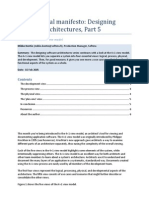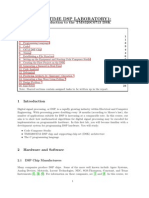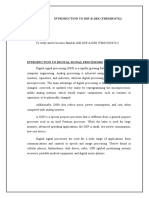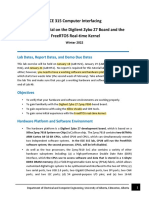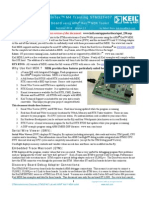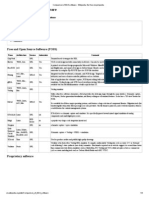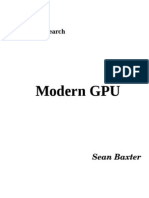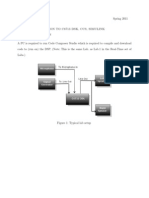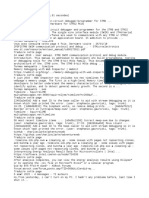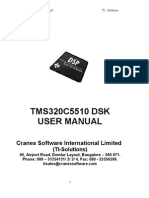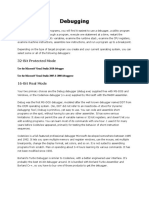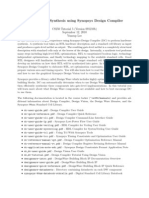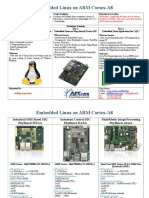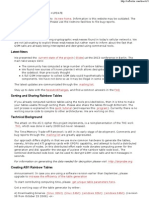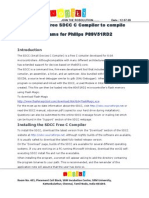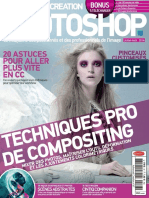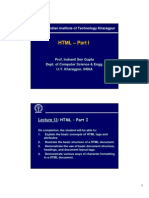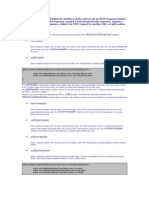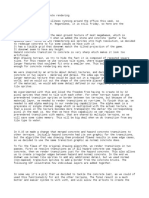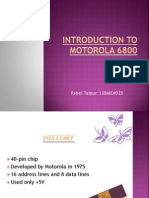SDCC - Small Device C Compiler
SDCC - Small Device C Compiler
Uploaded by
alberto55Copyright:
Available Formats
SDCC - Small Device C Compiler
SDCC - Small Device C Compiler
Uploaded by
alberto55Original Description:
Copyright
Available Formats
Share this document
Did you find this document useful?
Is this content inappropriate?
Copyright:
Available Formats
SDCC - Small Device C Compiler
SDCC - Small Device C Compiler
Uploaded by
alberto55Copyright:
Available Formats
SDCC - Small Device C Compiler
2014-03-17
SDCC - Small Device C Compiler
SDCC Home
News
Platforms
Download
Support
Who
Snapshots
Linux
Windows
Mac OS X
Documentation
Source
Regression
T ests
Download CSV
Differences
Documentation
SDCC Manual (pdf)
SDCC at
SourceForge
SDCC File Releases
SDCC Subversion
Repository
SDCC Forum
SDCC Wiki
Links and More!
SDCC Metrics by
Ohloh
What is SDCC?
SDCC is a retargettable, optimizing ANSI - C compiler suite that targets the Intel MCS51 based
microprocessors (8031, 8032, 8051, 8052, etc.), Maxim (formerly Dallas) DS80C390 variants, Freescale
(formerly Motorola) HC08 based (hc08, s08) and Zilog Z80 based MCUs (z80, z180, gbz80, Rabbit
2000/3000, Rabbit 3000A). Work is in progress on supporting the Microchip PIC16 and PIC18 targets. It can
be retargeted for other microprocessors.
SDCC suite is a collection of several components derived from different sources with different FOSS licenses.
SDCC compiler suite include:
sdas and sdld, a retargettable assembler and linker, based on ASXXXX, written by Alan Baldwin; (GPL).
sdcpp preprocessor, based on GCC cpp; (GPL).
ucsim simulators, originally written by Daniel Drotos; (GPL).
sdcdb source level debugger, originally written by Sandeep Dutta; (GPL).
sdbinutils library archive utilities, including sdar, sdranlib and sdnm, derived from GNU Binutils; (GPL)
SDCC run-time libraries; (GPL+LE). Pic device libraries and header files are derived from Microchip header
(.inc) and linker script (.lkr) files. Microchip requires that "The header files should state that they are only
to be used with authentic Microchip devices" which makes them incompatible with the GPL.
gcc-test regression tests, derived from gcc-testsuite; (no license explicitely specified, but since it is a
part of GCC is probably GPL licensed)
packihx; (public domain)
makebin; (zlib/libpng License)
sdcc C compiler, originally written by Sandeep Dutta; (GPL). Some of the features include:
extensive MCU specific language extensions, allowing effective use of the underlying hardware.
a host of standard optimizations such as global sub expression elimination, loop optimizations (loop
invariant, strength reduction of induction variables and loop reversing), constant folding and
propagation, copy propagation, dead code elimination and jump tables for 'switch' statements.
MCU specific optimizations, including a global register allocator.
adaptable MCU specific backend that should be well suited for other 8 bit MCUs
independent rule based peep hole optimizer.
a full range of data types: char (8 bits, 1 byte), short (16 bits, 2 bytes), int (16 bits, 2 bytes), long
(32 bit, 4 bytes), float (4 byte IEEE) and _Bool/bool;
basic (no integer constants) support for long long (64 bit, 8 bytes) data types for the z80, z180,
r2k, r3ka, gbz80, hc08 and s08 targets.
the ability to add inline assembler code anywhere in a function.
the ability to report on the complexity of a function to help decide what should be re-written in
assembler.
a good selection of automated regression tests.
SDCC was written by Sandeep Dutta and released under a GPL license. Since its initial release there have been
numerous bug fixes and improvements. As of December 1999, the code was moved to SourceForge where all the
"users turned developers" can access the same source tree. SDCC is constantly being updated with all the users'
and developers' input.
News
May 20th, 2013: Small Device C Compiler 3.3.0 released.
A new release of SDCC, the portable optimizing compiler for 8051, DS390, Z80, Z180, Rabbit 2000, HC08 and PIC
microprocessors is now available (http://sdcc.sourceforge.net). Sources, documentation and binaries compiled for
x86 Linux, x86 and x64 MS Windows and x86 and PPC Mac OS X are available.
SDCC 3.3.0 Feature List:
Many small improvements in code generation for the z80-related ports - merged smallopts branch
lospre (currently enabled for z80-related and hc08-related ports only) - merged lospre branch
More efficient initialization of globals in z80, z180, r2k and r3ka ports.
Inclusion of tests from the gcc test suite into the sdcc regression test suite led to many bugs being found
and fixed.
Split sdas390 from sdas8051
Merged big parts of ASxxxx v5 into sdas
New pic devices (synchronization with MPLABX 1.60). (Except for very old MCU-s.)
New script which disassembles those hex files, in which MCS51 code there is. (mcs51-disasm.pl)
Added the PIC16F1788 and PIC16F1789 devices.
C11 _Alignof operator.
C11 _Alignas alignment specifier.
C11 _Static_Assert static assertion.
Numerous feature requests and bug fixes are included as well.
You can download the release from:
https://sourceforge.net/projects/sdcc/files/
What Platforms are Supported?
Linux - x86, Microsoft Windows - x86, Microsoft Windows - x86_64 and Mac OS X are the primary, so called
"officially supported" platforms.
http://sdcc.sourceforge.net/
1/3
SDCC - Small Device C Compiler
2014-03-17
SDCC compiles natively on Linux and Mac OS X using gcc. Windows release and snapshot builds are made by
cross compiling to mingw32 on a Linux host.
Windows 9x/NT/2000/XP/Vista/7/8 users are recommended to use Cygwin
(http://sources.redhat.com/cygwin/) or may try the unsupported Microsoft Visual C++ build scripts.
Downloading SDCC
See the Sourceforge download page for the last released version including source and binary packages for Linux x86, Microsoft Windows - x86, Microsoft Windows - x86_64 and Mac OS X - ppc and i386.
Major Linux distributions take care of SDCC installation packages themselves and you will find SDCC in their
repositories. Unfortunately SDCC packages included in Linux disributions are often outdated. In this case users are
encouraged to compile the latest official SDCC release or a recent snapshot build by themselves or download the
pre-compiled binaries from Sourceforge download page.
SDCC is known to compile from the source code also on the following platforms:
Linux - x86_64
Linux - Alpha
Linux - IBM Power5
NetBSD - i386
NetBSD - Sparc64
FreeBSD - i386
SUN Solaris - i386
SUN Solaris - Sparc
Rasbian (Debian for Raspberry Pi) - ARMv6
SDCC is always under active development. Please consider downloading one of the snapshot builds if you have run
across a bug, or if the above release is more than two months old.
The latest development source code can be accessed using Subversion. The following will fetch the latest
sources:
svn checkout svn://svn.code.sf.net/p/sdcc/code/trunk/sdcc sdcc
... will create the sdcc directory in your current directory and place all downloaded code there. You can browse
the Subversion repository here.
Before reporting a bug, please check your SDCC version and build date using the -v option, and be sure to include
the full version string in your bug report. For example:
sdcc/bin > sdcc -v
SDCC : mcs51/gbz80/z80/avr/ds390/pic14/TININative/xa51 2.3.8 (Feb 10 2004) (UNIX)
Support for SDCC
SDCC and the included support packages come with fair amounts of documentation and examples. When they
aren't enough, you can find help in the places listed below. Here is a short check list of tips to greatly improve
your chances of obtaining a helpful response.
1. Attach the code you are compiling with SDCC. It should compile "out of the box". Snippets must compile and
must include any required header files, etc. Incomplete information will hamper your chance of a timely
response.
2. Specify the exact command you use to run SDCC, or attach your Makefile.
3. Specify the SDCC version (type "sdcc -v"), your platform and operating system.
4. Provide an exact copy of any error message or incorrect output.
Please attempt to include these 4 important parts, as applicable, in all requests for support or when reporting
any problems or bugs with SDCC. Though this will make your message lengthy, it will greatly improve your chance
that SDCC users and developers will be able to help you. Some SDCC developers are frustrated by bug reports
without code provided that they can use to reproduce and ultimately fix the problem, so please be sure to provide
sample code if you are reporting a bug!
Web Page - you are (X) here.
Mailing list: [use "BUG REPORTING" below if you believe you have found a bug.]
Send to the developer list <sdcc-devel.AT.lists.sourceforge.net> - for development work on SDCC
Send to the user list <sdcc-user.AT.lists.sourceforge.net> - [preferred] all developers and all users.
Subscribe to the user list
Bug Reporting - if you have a problem using SDCC, we need to hear about it. Please attach code to
reproduce the problem, and be sure to provide your email address so a developer can contact you if they
need more information to investigate and fix the bug.
Website/Documentation Issues - Please report erroneous, missing or outdated information
SDCC Message Forum - an account on Sourceforge is needed if you're going to post and reply. Short easy
online fill-in the blanks.
Open Knowledge Web Site - Run by Thorsten Godau <thorsten.godau.AT.gmx.de>
Who is SDCC?
Sandeep Dutta <sandeep.AT.users.sourceforge.net> - original author (SDCC's version of Torvalds)
Jean Loius-VERN <jlvern.AT.writeme.com> - substantial improvement in the back-end code generation.
Daniel Drotos <drdani.AT.mazsola.iit.uni-miskolc.hu> - Freeware simulator for 8051.
Kevin Vigor <kevin.AT.vigor.nu> - numerous enhancements and bug fixes to the Dallas ds390 tree.
Johan Knol <johan.knol.AT.users.sourceforge.net> - testing and patching ds390 tree, bug stompper
extrodanaire
http://sdcc.sourceforge.net/
2/3
SDCC - Small Device C Compiler
2014-03-17
Scott Dattalo <scott.AT.dattalo.com> - sdcc for Microchip PIC controller target
Karl Bongers <karl.AT.turbobit.com> - mcs51 support, winbin builds, and an occasional bug.
Bernhard Held <bernhard.AT.bernhardheld.de> - snpshot builds and general housekeeping
Frieder Ferlemann <Frieder.Ferlemann.AT.web.de> - contributions to the documentation and last stages of
code generation
Jesus Calvino-Fraga <jesusc.AT.ece.ubc.ca> - math functions, AOMF51, linker improvements
Borut Raem <borut.razem.AT.gmail.com> - WIN32 MSC, cygwin and mingw ports, NSIS installer,
preprocessor and front end improvements, bug fixing, snapshot builds on Distibuted Compile Farm, ...
Vangelis Rokas <vrokas.AT.otenet.gr> - PIC16 taget development for Microchip PIC18F microcontrollers
Erik Petrich <epetrich.AT.users.sourceforge.net> - Bug fixes and improvements for the front end, 8051, z80
and hc08
Dave Helton <dave.AT.kd0yu.com> - website design
Paul Stoffregen <paul.AT.pjrc.com> - mcs51 optimizations and website maintenance.
Michael Hope <michaelh.AT.juju.net.nz> - initial Z80 target, additional coding and bug fixes.
Maarten Brock <sourceforge.brock.AT.dse.nl> - several bug fixes and improvements, esp. for mcs51 target
Raphael Neider <RNeider.AT.web.de> - bug fixes and optimizations for PIC16, completion of the PIC14 target
Philipp Klaus Krause <pkk.AT.spth.de> - z80 and gbz80 bug fixes and optimizations, z180 target
Leland Morrison <enigmalee.AT.sourceforget.net> - Rabbit 2000 support: the target code generator,
sdasrab assembler and ucsim support
Molnr Kroly <molnarkaroly.AT.users.sf.net> - adding pic devices, developing and maintaining pic device
files generation scripts
SDCC has had help from a number of external sources, including:
Alan Baldwin <baldwin.AT.shop-pdp.kent.edu> - Initial version of ASXXXX and ASLINK.
John Hartman <noice.AT.noicedebugger.com> - Porting ASXXXX and ASLINK for 8051.
Dmitry S. Obukhov <dso.AT.usa.net> - malloc and serial I/O routines.
Pascal Felber - Some of the Z80 related files are borrowed from the Gameboy Development Kit (GBDK).
The GCC development team - for GNU C preprocessor, the basis of sdcpp preprocessor and gcc test suite,
partially included into the SDCC regression test suite
The GNU Binutils development team - for GNU Binutils, the basis of sdbinutils
Boost Community - for Boost C++ libraries used in sdcc compiler
Timo Bingmann - for STX B+ Tree C++ Template Classes used in sdcc compiler
Malini Dutta <malini.AT.mediaone.net> - Sandeep's wife, for her patience and support.
Past news
May 12th, 2013: SDCC 3.3.0 RC3 released.
SDCC 3.3.0 Release Candidate 3 source, doc and binary packages for x86 Linux, 32 bit Windows, 64 bit Windows
and universal Mac OS X are available in corresponding folders at: http://sourceforge.net/projects/sdcc/files/.
May 11th, 2013: SDCC 3.3.0 RC2 released.
SDCC 3.3.0 Release Candidate 2 source, doc and binary packages for x86 Linux, 32 bit Windows, 64 bit Windows
and universal Mac OS X are available in corresponding folders at: http://sourceforge.net/projects/sdcc/files/.
May 5th, 2013: SDCC 3.3.0 RC1 released.
SDCC 3.3.0 Release Candidate 1 source, doc and binary packages for x86 Linux, 32 bit Windows and universal Mac
OS X are available in corresponding folders at: http://sourceforge.net/projects/sdcc/files/.
Previous News
This site is hosted by
Webmaster
http://sdcc.sourceforge.net/
Last updated:
June 17, 2013 08:43:19.
3/3
You might also like
- Architectural Manifesto: Designing Software Architectures, Part 5Document6 pagesArchitectural Manifesto: Designing Software Architectures, Part 5Felix R57% (7)
- HSGQ EPON OLT Command User Manual-V2.2.0Document79 pagesHSGQ EPON OLT Command User Manual-V2.2.0stephen liu100% (1)
- Genus Synthesis Solution: Genus RAK For Beginners With Common UI (CUI)Document22 pagesGenus Synthesis Solution: Genus RAK For Beginners With Common UI (CUI)eadaladarenu100% (1)
- PlayStation Architecture: Architecture of Consoles: A Practical Analysis, #6From EverandPlayStation Architecture: Architecture of Consoles: A Practical Analysis, #6No ratings yet
- Mikrobasic ManualDocument348 pagesMikrobasic ManualLucho AngelNo ratings yet
- SRS - How to build a Pen Test and Hacking PlatformFrom EverandSRS - How to build a Pen Test and Hacking PlatformRating: 2 out of 5 stars2/5 (1)
- Lab0 PDFDocument18 pagesLab0 PDFVishal Pal100% (1)
- ProjectDocument4 pagesProjectvish1213No ratings yet
- Real-Time DSP Laboratory1:: An Introduction To The TMS320C6713 DSKDocument20 pagesReal-Time DSP Laboratory1:: An Introduction To The TMS320C6713 DSKNeha PankiNo ratings yet
- Real-Time DSP Laboratory1:: An Introduction To The TMS320C6713 DSKDocument25 pagesReal-Time DSP Laboratory1:: An Introduction To The TMS320C6713 DSKNagaraju NeelaNo ratings yet
- Sitara Linux Training - Hands On With QTDocument43 pagesSitara Linux Training - Hands On With QTKyle HolderNo ratings yet
- VOice Recod DSK6713Document14 pagesVOice Recod DSK6713Ashish MangalNo ratings yet
- I2c PaperDocument14 pagesI2c PaperParvinder SinghNo ratings yet
- Psoc IntroDocument4 pagesPsoc IntrosurekhapsNo ratings yet
- Matlab and Ccs Interface Manual With Filter ProgramDocument65 pagesMatlab and Ccs Interface Manual With Filter ProgramSugumar Sar DuraiNo ratings yet
- Ece5950 Tut2 DC PDFDocument15 pagesEce5950 Tut2 DC PDFsudip_on_air1No ratings yet
- Ex No: Introduction To DSP & DSK (Tms320C6711) DateDocument9 pagesEx No: Introduction To DSP & DSK (Tms320C6711) DateParthaSarathyNo ratings yet
- CW HCS12 RNDocument2 pagesCW HCS12 RNLex TueayNo ratings yet
- Ece 315 Computer Interfacing Lab #0: Tutorial On The Digilent Zybo Z7 Board and The Freertos Real-Time KernelDocument13 pagesEce 315 Computer Interfacing Lab #0: Tutorial On The Digilent Zybo Z7 Board and The Freertos Real-Time KernelShawn ShadeNo ratings yet
- Getting Started With The SDCC/MetaLink 8051 C Cross Compiler/Assembler and The XS 40 Prototyping Platform - A User's GuideDocument46 pagesGetting Started With The SDCC/MetaLink 8051 C Cross Compiler/Assembler and The XS 40 Prototyping Platform - A User's Guideprabhunithin1No ratings yet
- Training 2Document44 pagesTraining 2Baluvu Jagadish100% (1)
- D.S.P/MATLAB Theory & ExperimentsDocument57 pagesD.S.P/MATLAB Theory & ExperimentsNandagopal Sivakumar50% (4)
- ST-LINUX - Distribution and Development EnvironmentDocument10 pagesST-LINUX - Distribution and Development Environmentdmitry_diolanNo ratings yet
- Getting Started With CodeWarrior IDE From FreescaleDocument8 pagesGetting Started With CodeWarrior IDE From FreescaleIonela100% (1)
- Readme File For Code ExampleDocument12 pagesReadme File For Code ExamplejulionbaNo ratings yet
- STM32F4-Discovery Keil TrainingDocument32 pagesSTM32F4-Discovery Keil TrainingDefne AktemizNo ratings yet
- DM STF4BBDocument11 pagesDM STF4BBa137631100% (1)
- SOC EncounterDocument69 pagesSOC Encountermaxxtorr723No ratings yet
- Lab 0Document8 pagesLab 0huutan86No ratings yet
- SocialServer ENDocument25 pagesSocialServer ENDoordarshan GirnarNo ratings yet
- Comparison of EDA Software - Wikipedia, The Free EncyclopediaDocument4 pagesComparison of EDA Software - Wikipedia, The Free EncyclopediaMani Kandan KNo ratings yet
- LinuxDspTools GettingStartedGuide v98Document36 pagesLinuxDspTools GettingStartedGuide v98asdNo ratings yet
- Modern GPUDocument221 pagesModern GPUx2y2z2rm100% (1)
- Matlab 6713Document15 pagesMatlab 6713ameiyappan5697No ratings yet
- Dspworkshop Part1 2006Document64 pagesDspworkshop Part1 2006Naagaraaju AaraadhyulaNo ratings yet
- CE018 ReadmeDocument7 pagesCE018 ReadmejulionbaNo ratings yet
- Digital Signal Processing Lab: CODE NO: EC05177 List of ExperimentsDocument33 pagesDigital Signal Processing Lab: CODE NO: EC05177 List of ExperimentsSai SaranyaNo ratings yet
- TU00003 003 How To Generate Code For The Ezdsp F2812 Using Simulink PDFDocument18 pagesTU00003 003 How To Generate Code For The Ezdsp F2812 Using Simulink PDFkhethanNo ratings yet
- SDDF DF DFDocument2 pagesSDDF DF DFpawanhv1454No ratings yet
- Code WarriorDocument16 pagesCode WarriorNaumanNo ratings yet
- Adapter Board DM-STF4BB PDFDocument11 pagesAdapter Board DM-STF4BB PDFdangkhuyenmaiNo ratings yet
- Full Flow RAK - RTL To Place & Route, Including ECO: Rapid Adoption Kit (RAK)Document39 pagesFull Flow RAK - RTL To Place & Route, Including ECO: Rapid Adoption Kit (RAK)dupipiNo ratings yet
- MPP Development ReferenceDocument10 pagesMPP Development Referencesayyed mohsen ZahraeeNo ratings yet
- User Manual - c5510Document42 pagesUser Manual - c5510Rahul Goutham GanduriNo ratings yet
- Digital Signal Processing and Applications With The TMS320C6713 DSKDocument63 pagesDigital Signal Processing and Applications With The TMS320C6713 DSKliametaNo ratings yet
- Release NotesDocument14 pagesRelease NotesmedinaavNo ratings yet
- Debugging: 32-Bit Protected ModeDocument6 pagesDebugging: 32-Bit Protected ModeAbhishek TawdeNo ratings yet
- Tut5 DCDocument20 pagesTut5 DCPhuc HoangNo ratings yet
- Dialogic DSI Development Package For Linux Release Notes: Document Reference: RN003DPK Publication Date: March 2013Document63 pagesDialogic DSI Development Package For Linux Release Notes: Document Reference: RN003DPK Publication Date: March 2013inr0000zhaNo ratings yet
- InstallDocument44 pagesInstallSachin KhandareNo ratings yet
- Embedded Linux On ARM Cortex-A8Document2 pagesEmbedded Linux On ARM Cortex-A8JOHNSON JOHNNo ratings yet
- A5/1 Security Project: Latest NewsDocument2 pagesA5/1 Security Project: Latest NewsJan NilssonNo ratings yet
- Silvaco EDA DemoDocument11 pagesSilvaco EDA DemobhataviNo ratings yet
- SDCC User Guid For P89V51RD2Document3 pagesSDCC User Guid For P89V51RD2Arvind SinghNo ratings yet
- Mohit - Mahajan - Embedded Programmer - ResumeDocument4 pagesMohit - Mahajan - Embedded Programmer - Resumekalyan.oneitcorpNo ratings yet
- Intermediate C Programming for the PIC Microcontroller: Simplifying Embedded ProgrammingFrom EverandIntermediate C Programming for the PIC Microcontroller: Simplifying Embedded ProgrammingNo ratings yet
- C Programming for the Pc the Mac and the Arduino Microcontroller SystemFrom EverandC Programming for the Pc the Mac and the Arduino Microcontroller SystemNo ratings yet
- PLC: Programmable Logic Controller – Arktika.: EXPERIMENTAL PRODUCT BASED ON CPLD.From EverandPLC: Programmable Logic Controller – Arktika.: EXPERIMENTAL PRODUCT BASED ON CPLD.No ratings yet
- Raspberry Pi :The Ultimate Step by Step Raspberry Pi User Guide (The Updated Version )From EverandRaspberry Pi :The Ultimate Step by Step Raspberry Pi User Guide (The Updated Version )Rating: 4 out of 5 stars4/5 (4)
- C Programming for the PIC Microcontroller: Demystify Coding with Embedded ProgrammingFrom EverandC Programming for the PIC Microcontroller: Demystify Coding with Embedded ProgrammingNo ratings yet
- Modern Arm Assembly Language Programming: Covers Armv8-A 32-bit, 64-bit, and SIMDFrom EverandModern Arm Assembly Language Programming: Covers Armv8-A 32-bit, 64-bit, and SIMDNo ratings yet
- CISCO PACKET TRACER LABS: Best practice of configuring or troubleshooting NetworkFrom EverandCISCO PACKET TRACER LABS: Best practice of configuring or troubleshooting NetworkNo ratings yet
- BetterHomesGardensAustralia201405 PDFDocument244 pagesBetterHomesGardensAustralia201405 PDFalberto55No ratings yet
- BackyardGardenDesignIdeas11 4Document116 pagesBackyardGardenDesignIdeas11 4alberto55No ratings yet
- BackyardGardenDesignIdeas3 8Document67 pagesBackyardGardenDesignIdeas3 8alberto55100% (1)
- Beginning JapaneseDocument382 pagesBeginning Japanesealberto55100% (10)
- BackyardGardenDesignIdeas3 8Document67 pagesBackyardGardenDesignIdeas3 8alberto55100% (1)
- Architect 201409Document156 pagesArchitect 201409alberto55No ratings yet
- Artists Illustrators 201303Document84 pagesArtists Illustrators 201303alberto55100% (3)
- Architecture Design 201410Document134 pagesArchitecture Design 201410alberto55100% (2)
- American Iron Magazine - Issue 316.bakDocument148 pagesAmerican Iron Magazine - Issue 316.bakalberto55No ratings yet
- Advanced Creation Photoshop No 67Document100 pagesAdvanced Creation Photoshop No 67alberto55No ratings yet
- A Japanese Grammar - HoffmannDocument398 pagesA Japanese Grammar - Hoffmannichliebebach100% (6)
- Advanced Creation Photoshop No 49Document100 pagesAdvanced Creation Photoshop No 49alberto55No ratings yet
- A Japanese Grammar - HoffmannDocument398 pagesA Japanese Grammar - Hoffmannichliebebach100% (6)
- Advanced Creation Photoshop Issue 65Document100 pagesAdvanced Creation Photoshop Issue 65alberto55100% (1)
- Advanced Creation Photoshop Issue 52Document100 pagesAdvanced Creation Photoshop Issue 52alberto55100% (1)
- Spectrometer InstallationDocument2 pagesSpectrometer InstallationSteven TaylorNo ratings yet
- Introduction To Hadoop and Mapreduce - VM SetupDocument4 pagesIntroduction To Hadoop and Mapreduce - VM SetupDavid LlanesNo ratings yet
- SCN and Instance RecoveryDocument9 pagesSCN and Instance RecoveryRahul KumarNo ratings yet
- Employment: Objective IBMDocument1 pageEmployment: Objective IBMAnonymous uM4svfNo ratings yet
- Web FacingDocument205 pagesWeb FacingAnonymous s3TzBvwS1100% (1)
- Reliable Data TransferDocument47 pagesReliable Data TransferNavanNo ratings yet
- DB2 and Transparent LDAP in DB2 DPF - Misleading Error SQL30082N - Db2talkDocument6 pagesDB2 and Transparent LDAP in DB2 DPF - Misleading Error SQL30082N - Db2talkprakash_6849No ratings yet
- Questions-with-Answers: To Download Full Version of All The Questions - ClickDocument21 pagesQuestions-with-Answers: To Download Full Version of All The Questions - ClickTarget2009No ratings yet
- Beginner'S Guide To: Brute Force & Ddos AttacksDocument23 pagesBeginner'S Guide To: Brute Force & Ddos Attacksumesh3959No ratings yet
- SQL Server Basics NotesDocument12 pagesSQL Server Basics NotesPrashant KumarNo ratings yet
- BSPWM Beginners GuideDocument5 pagesBSPWM Beginners GuideAbhashNo ratings yet
- Creating The Parted Magic Live USBDocument2 pagesCreating The Parted Magic Live USBegiovannottiNo ratings yet
- HTML - Part I: Indian Institute of Technology KharagpurDocument26 pagesHTML - Part I: Indian Institute of Technology KharagpurAbdul Ghani KhanNo ratings yet
- Online Book Store: Department of Information Technology Minor Project 2019-2020Document16 pagesOnline Book Store: Department of Information Technology Minor Project 2019-2020Vinayak KanherkarNo ratings yet
- Smart CardDocument23 pagesSmart CardSmruti Ranjan SamalNo ratings yet
- Bug Busting - A GuideDocument94 pagesBug Busting - A GuidernbhushannNo ratings yet
- Using The HttpServletResponse InterfaceDocument19 pagesUsing The HttpServletResponse Interfaceapi-3710034No ratings yet
- Fortigate Logging and Reporting 52Document56 pagesFortigate Logging and Reporting 52denny tobingNo ratings yet
- Crypto Key ManagementDocument31 pagesCrypto Key ManagementFachrizal Rizky FerdiansyahNo ratings yet
- Week 11 Graded Assessment: Progress Weekly Quiz ReportDocument5 pagesWeek 11 Graded Assessment: Progress Weekly Quiz ReportPrakhar GuptaNo ratings yet
- JIRA Agile Essentials - Sample ChapterDocument16 pagesJIRA Agile Essentials - Sample ChapterPackt Publishing50% (2)
- Job Shop Scheduling & Dispatching Rules: Presentation OnDocument14 pagesJob Shop Scheduling & Dispatching Rules: Presentation OnimnithinNo ratings yet
- Factorio Friday Facts 214Document2 pagesFactorio Friday Facts 214ShoggothBoyNo ratings yet
- Using Application ContextDocument25 pagesUsing Application ContextArif RakhmanNo ratings yet
- Introduction To Motorola 6800Document45 pagesIntroduction To Motorola 6800api-249964743No ratings yet
- Srivats Iyer ResumeDocument2 pagesSrivats Iyer ResumeSrivats IyerNo ratings yet
- Experienced SmartPlant 3D Coordinator at FluorDocument2 pagesExperienced SmartPlant 3D Coordinator at FluorJason RogersNo ratings yet
- JunosDocument17 pagesJunosSimmhadri SimmiNo ratings yet
